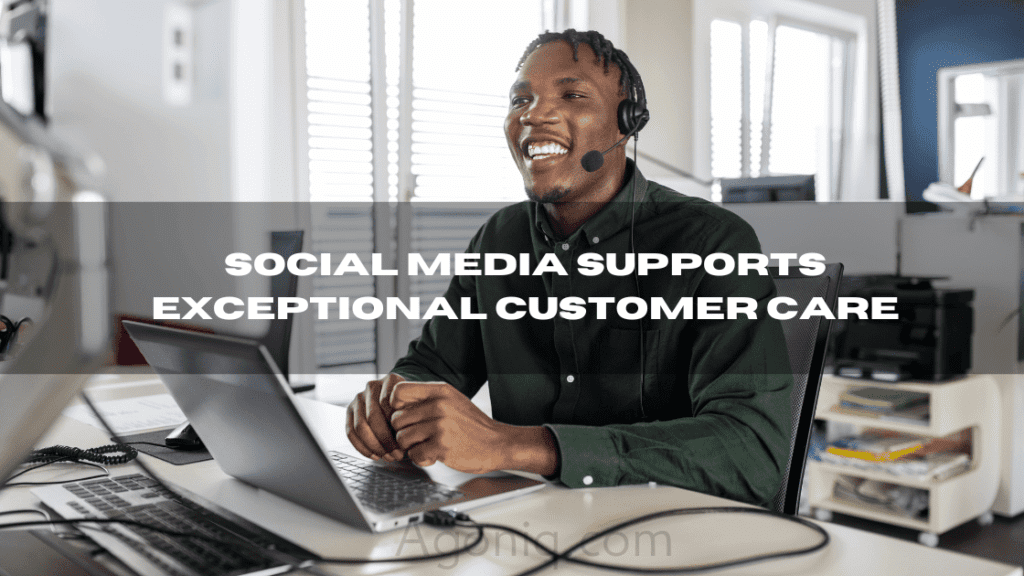Why Every Business Needs a Strong Social Media Presence


In today’s digital age, having a strong social media presence is no longer an option for businesses, but a necessity. Social media platforms offer a unique opportunity for businesses to connect with their customers, build their brand reputation, and drive sales.
In this article, we’ll explore the reasons why every business needs a strong social media presence and how to leverage it effectively.


Social Media Builds Brand Reputation and Loyalty
Social media can help businesses build a strong reputation and foster loyalty among their customers. According to a study by Sprout Social, 70% of consumers are more likely to make a purchase from a brand they follow on social media. Social media allows businesses to engage with their customers, respond to their feedback, and showcase their values and mission. By building a strong social media presence, businesses can establish trust and credibility with their customers, leading to increased brand loyalty.
One way to build brand reputation and loyalty on social media is by sharing user-generated content. User-generated content is any content created by customers that features a brand or its products. By sharing user-generated content, businesses can showcase their customers’ experiences and build a sense of community around their brand.
For example, fashion brand ASOS encourages its customers to share their outfits on social media using the hashtag #AsSeenOnMe. The brand then features the best posts on its website and social media channels, creating a sense of community and fostering loyalty among its customers.
Social Media Data Informs Competitive Positioning
Social media data can be used to gain insights on competitors and improve a business’s competitive position. According to a study by Hootsuite, 78% of businesses use social media for competitive intelligence. Social media platforms offer a wealth of data on competitors, including their marketing strategies, customer engagement, and product offerings. By analyzing this data, businesses can gain a better understanding of their competitive landscape and adjust their strategies accordingly.
For example, businesses can use social media listening tools to monitor their competitors’ social media accounts and track their mentions. By analyzing their competitors’ social media activity, businesses can identify gaps in the market, uncover new opportunities, and adjust their strategies to stay ahead of the competition.
Social Media Data Creates Customer-Centric Business Strategies
Social media data can also be used to gain a better understanding of customers and inform more customer-centric business strategies. According to a study by Salesforce, 84% of customers say being treated like a person, not a number, is very important to winning their business. Social media platforms offer a unique opportunity to connect with customers and gather feedback on their needs, preferences, and pain points. By analyzing this data, businesses can create more personalized and effective marketing campaigns, products, and services.
For example, businesses can use social media analytics tools to track their customers’ demographics, interests, and behaviors. By analyzing this data, businesses can create customer personas and tailor their marketing messages to specific segments of their audience. For example, a fitness brand can create a customer persona for young female professionals who are interested in yoga and use this persona to create targeted marketing campaigns on social media.
Social Media Marketing Supports Public Relations
Social media can be used to support public relations efforts and build a brand’s reputation. According to a study by Cision, 91% of journalists use social media to research stories. Social media platforms offer a unique opportunity for businesses to share their news, announcements, and thought leadership content with a wider audience. By building a strong social media presence, businesses can establish themselves as industry leaders and build their reputation as a trusted and reliable brand.
For example, businesses can use social media to share their press releases, media coverage, and thought leadership articles. By sharing this content on social media, businesses can reach a wider audience and build their reputation as an industry expert. For example, a tech brand can share its latest product launch on social media and include a link to its press release, media coverage, and thought leadership articles.
Social Media Plays a Critical Role in Crisis Management
Social media can also be used to manage crises and mitigate risks. According to a study by the Institute for Public Relations, 80% of crises now have a digital component. Social media platforms offer a real-time and public forum for businesses to address customer concerns, provide updates on the situation, and demonstrate their commitment to transparency and accountability. By building a strongsocial media presence, businesses can be better prepared to manage crises and protect their reputation.
For example, businesses can use social media to provide real-time updates on the situation, answer customer questions, and address concerns. By being transparent and responsive on social media, businesses can demonstrate their commitment to their customers and build trust and credibility. For example, a restaurant chain can use social media to provide updates on its food safety protocols and address customer concerns during a food safety crisis.
Social Commerce Introduces Products and Services to Customers
Social media can be used to promote products and services and drive sales. According to a study by Hootsuite, 54% of social media users research products on social media platforms. Social media platforms offer a unique opportunity for businesses to showcase their products and services in a visually appealing and engaging way. By building a strong social media presence, businesses can reach a wider audience and introduce their products and services to potential customers.
For example, businesses can use social media to create shoppable posts and ads. Shoppable posts and ads allow customers to purchase products directly from social media platforms, making the buying process more convenient and seamless. For example, a fashion brand can create a shoppable post on Instagram featuring its latest collection and allow customers to purchase the products directly from the post.


Social Media Supports Exceptional Customer Care
Social media can also be used to provide excellent customer service and support. According to a study by Sprout Social, 90% of consumers have used social media to communicate with a brand. Social media platforms offer a convenient and public forum for customers to ask questions, provide feedback, and seek assistance. By building a strong social media presence, businesses can demonstrate their commitment to customer care and build a positive reputation.
For example, businesses can use social media to provide quick and personalized responses to customer inquiries. By responding quickly and personally to customer inquiries, businesses can demonstrate their commitment to customer care and build trust and credibility. For example, a telecom brand can use social media to provide quick and personalized responses to customer inquiries about their billing, technical support, and account management.
Conclusion
In conclusion, having a strong social media presence is crucial for businesses of all sizes. Social media offers a unique opportunity for businesses to build their reputation, gain insights on competitors and customers, support public relations efforts, manage crises, and drive sales. By investing in a strong social media presence, businesses can establish themselves as industry leaders and build a loyal customer base.
To build a strong social media presence, businesses should focus on creating engaging and relevant content, using social media analytics tools to track their performance, and building a community around their brand. By following these best practices, businesses can leverage the power of social media to achieve their business goals and build a strong reputation in their industry.





Leave a Reply